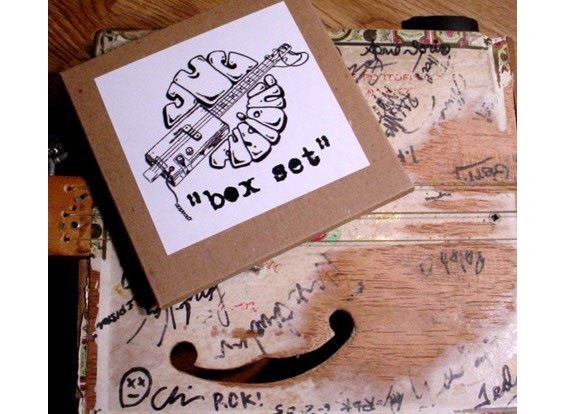I apparently had better things to do this weekend than hear the latest self-righteous, all music is free, the Web changes the fabric of reality post about the music business, this time from Michael Arrington of Techcrunch. The title is intended to get a rise out of people. (“These Crazy Musicians Still Think They Should Get Paid For Recorded Music.” Uh … thanks?) But tracking through links, I came upon this quote:
Recorded music is nothing but marketing material to drive awareness of an artist. Websites that bring that music to listeners are doing artists a favor. In fact, they’re doing them a favor that they should (and will) be paid for.
Now, regular readers know CDM is all about new business models for music, all about ditching DRM, not at all about archaic royalty schemes. And certainly I can’t think of a good argument for the prompt for Arrington’s piece, which was that Billy Bragg thinks artists are owed money retroactively by a site to which they’ve already uploaded their own music.
Here’s my answer to that:
Recorded music has value to consumers.
And, in business, if something has value somewhere, it’s a business. So, yeah, maybe someone’s teenage daughter now uses BitTorrent as her only music source. Meanwhile, a crate digger in Brooklyn will pay US$5000 in one evening for a short stack of rare vinyls, or $40 to import a new release. Value is in the eye of the consumer. Digital doesn’t change that. (Then again, if digital doesn’t change that, Michael Arrington isn’t as important. I’m beginning to see the problem.)
Promotion has value to artists — but encouraging Web payola is ridiculous.
In fact, a lot of the previous promotional budget that validated large record labels’ existence is going to get tougher for artists to swallow. Think more focused promotion — and definitely don’t assume artists think the Web will be entitled to their hard-earned dollars just for its ability to promote their work. Arrington goes on to say, “Young artists and songwriters in particular benefit from these services – Until a few years ago they had almost no way to break into the mainstream without getting a label to promote them.” Why should artists pay for exposure on these sites if they’re already getting that exposure, driven by the masses and blog buzz, for free (or cheap)? And how many artists are just as reliant now on labels as before — perhaps smaller, smarter labels instead of majors, but labels nonetheless — to help them navigate the increasingly dense world of Web music?
Meanwhile, I’m sure sites like Last.fm are perfectly happy to get rich off of ad dollars and other models, before they start trying to extort artists.
Almost all of the conventional blog wisdom about the music business in the Web world seems wrong to me. Recorded music seems to have more value when you have access to the music you want, and when you can build relationships (and literally talk to) the artists you love. And labels become more important when there’s more to navigate — not big, dumb labels with lots of cash, but focused, intelligent labels that can better build relationships with artists and listeners.
I’ll close instead with what I think could be the antidote to all of this, which gets back to the image at top. Things you make (or “Create”, as we like to say around here) have value to you and other people. And as everything else becomes commoditized, people will increasingly care more about the things you care about making. The Web will give you tools to do that. You may not have to pay anyone — certainly not pay much — because once people are getting connected to other people who care about the product, there will be a natural profit for the Website, the consumer, and the seller. That may sound touchy-feely, but it’s really basic business. And business is what seems to be missing in Arrington’s whole argument. If you’re going to the trouble of recording music, odds are you’ll want to get paid for it. (Otherwise, you’d give away that t-shirt you sell at the show, too. It’s also marketing.) The good news is: that transaction could be more about what you’ve made, and less about lots of marketing and imaginary value.
(I say this, because I know the people at Etsy — a craft marketplace that is taking gradual steps into areas like music — agree. See: Etsy’s Storque on “Homemade Music”, which inspired the image.)
For different rebuttal, see:
These crazy bloggers still think they understand the music business [e-consultancy]
Unfortunately, the writer there takes the bait to make this about piracy and “theft”, which I think misses the point. As we saw with a game developer of all things, seeing the issue as theft versus rights misses the basic business question of the value perceived by your customer. That’s not to ignore the problems of piracy. But the whole question was what musicians should or shouldn’t be paid for what they produce. And that’s at the very heart of the music business.
